 Petzlover
Petzlover Doxiepoo is originated from United States but Formosan Mountain Dog is originated from Taiwan. Doxiepoo may grow 27 cm / 10 inches shorter than Formosan Mountain Dog. Doxiepoo may weigh 11 kg / 24 pounds lesser than Formosan Mountain Dog. Doxiepoo may live 3 years more than Formosan Mountain Dog. Doxiepoo may have less litter size than Formosan Mountain Dog. Doxiepoo requires Moderate Maintenance. But Formosan Mountain Dog requires Low Maintenance
Doxiepoo is originated from United States but Formosan Mountain Dog is originated from Taiwan. Doxiepoo may grow 27 cm / 10 inches shorter than Formosan Mountain Dog. Doxiepoo may weigh 11 kg / 24 pounds lesser than Formosan Mountain Dog. Doxiepoo may live 3 years more than Formosan Mountain Dog. Doxiepoo may have less litter size than Formosan Mountain Dog. Doxiepoo requires Moderate Maintenance. But Formosan Mountain Dog requires Low Maintenance
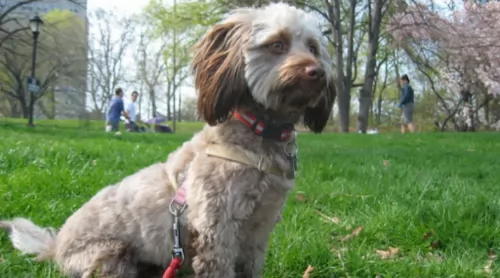 The Doxiepoo is a designer dog breed - a combination of the Dachshund who was used to hunt for Badgers and the Poodle, a dog bred in France to essentially be a lap dog. There is however some dispute as to whether the Poodle descends from Germany or from the French Barbet.
The Doxiepoo is a designer dog breed - a combination of the Dachshund who was used to hunt for Badgers and the Poodle, a dog bred in France to essentially be a lap dog. There is however some dispute as to whether the Poodle descends from Germany or from the French Barbet.
Wherever the parents hail from, the Doxiepoo hails from the United States of America.
With both the Poodle and the Dachshund being intelligent, fun and loving type of canines, the two of them together have brought out a wonderful hybrid pet in the Doxiepoo. Today, the Doxiepoo is bred with other Doxiepoos.
 The Formosan Mountain Dog is most often known as the Taiwan dog and it is a landrace indigenous to Taiwan. It is a small to medium breed of dog that was semi-wild at one time. The colonialization of Taiwan and other foreigners help to fully domesticate the Formosan Mountain Dog. They were found to be very trainable and uniquely suited for the terrain around Taiwan. The dogs were easy to train and now serve as hunting dogs, stunt dogs, guard dogs, rescue dogs, therapy dog and personal companions. There are three types of Formosans two smaller types and one medium. However, the original pure Formosan Mountain Dog is getting close to extinction again because the government and people have provided no protection or conservation efforts for them. These dogs have been living in Taiwan in the mountains and were called Formosan Mountain Dogs when Taiwan was known as Formosa. They come from a line of Southeast Asian hunting/gun dogs and they are considered ‘rare’ now.
The Formosan Mountain Dog is most often known as the Taiwan dog and it is a landrace indigenous to Taiwan. It is a small to medium breed of dog that was semi-wild at one time. The colonialization of Taiwan and other foreigners help to fully domesticate the Formosan Mountain Dog. They were found to be very trainable and uniquely suited for the terrain around Taiwan. The dogs were easy to train and now serve as hunting dogs, stunt dogs, guard dogs, rescue dogs, therapy dog and personal companions. There are three types of Formosans two smaller types and one medium. However, the original pure Formosan Mountain Dog is getting close to extinction again because the government and people have provided no protection or conservation efforts for them. These dogs have been living in Taiwan in the mountains and were called Formosan Mountain Dogs when Taiwan was known as Formosa. They come from a line of Southeast Asian hunting/gun dogs and they are considered ‘rare’ now.
According to historian Dr. Sung Yung-yi, the breed went through 4 major catastrophes that affected their development. The first of these was the Dutch Establishment in 1624. The Dutch colonized Taiwan and imported both people and dogs. The dog they brought in was called the Flying Dog and was either Greyhound or Pointer. Eventually, the Flying Dog bred with the Formosan Mountain Dog. This along with the slaughter of dogs belonging to the indigenous people by the government, starting the decline of the original Taiwan dog.
In 1895, it was the Japanese acquiring Taiwan following the First Sino-Japanese War. The Japanese bred the Formosan Mountain Dog extensively with the own Japanese dogs. This further diluted the line and authenticity of Taiwan dogs.
This was followed by World War II when German Shepherds traveled with the US Army and they cross-bred with the Formosan. This was the third major dilution of the Formosan Mountain dog line. At the same time, the Japanese government considered the Formosan Mountain Dog a sanitation threat and barbaric. They massacred them in large numbers in the name of sanitation.
The fourth and final dilution took place during the Kuomintang Era beginning in 1945 with the arrival of the Chinese Nationalist Party. They brought with them the culture of eating dogs. During this time the economy of Taiwan took off and business people began to import their own foreign dogs that were high priced purebreds. These dogs bred with the Formosan and other Formosans were just abandoned to die. The ranks of the breed became very thin indeed. Today’s pure Formosan is highly valuable and extremely rare. Because of all the crossbreeding over the centuries, today’s purebred Formosan Mountain Dog is very different from the Taiwan dog of old. Today’s Formosan is loved all over the island and is a companion and watchdog.
Today there is an effort by Taiwanese ecologists to put together a research project that would study and preserve the Formosan in its indigenous form. Dr. Yung-yi led this effort. He located only 46 dogs with a pure pedigree, 21 females and 25 males. They let the Food and Agricultural of the United Nations know and the dogs were labeled close to extinction. Reproducing from the indigenous dogs to purify and increase the breed was the goal. The government was not very supportive.
Today the Royal Air Force is looking at the Formosan Dog to use for military security. They are currently only using German Shepherds and needed another choice. It was decided that the Formosan Mountain Dog had a better sense of smell, dexterity, alertness, and hearing as well as better padding on their paws.
Through these efforts and those of foundation stock breeders and owners, the Formosan Mountain Dog in its indigenous form was brought back. Some call this dog a purebred Formosan while others consider it a new type. Standards were presented to the FCI for registrations as a purebred. This debate continues today
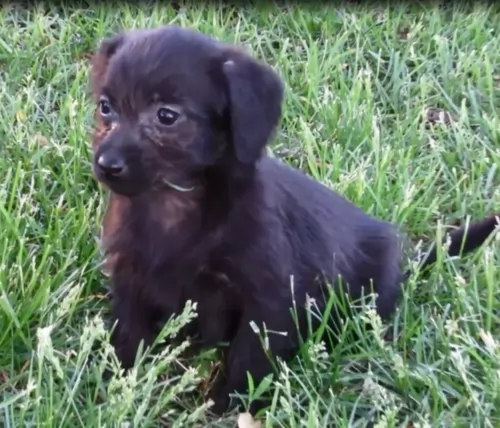 The Doxiepoo can range from being a small to medium sized dog, standing at anything between 20cm to 25cm in size and weighing between 3kg and 7kg, depending much on whether a standard, miniature or toy sized poodle was used in the breeding.
The Doxiepoo can range from being a small to medium sized dog, standing at anything between 20cm to 25cm in size and weighing between 3kg and 7kg, depending much on whether a standard, miniature or toy sized poodle was used in the breeding.
The Doxiepoo could look like either one of the two breeds, but he will have a strong, sturdy body with a curly or wavy coat of varying lengths and various colors - cream, black, tan, apricot, grey or white. The poodle side of him ensures he is a hypoallergenic dog.
Between the Dachshund and the Poodle, you’re going to get a wonderful array of characteristics as they both come with their strong points. Certainly you will be well entertained and amused by your pet, while he can also be useful as a watchdog.
Being a small dog, he will fit well into life in the city or in the countryside. He is as bright as a button and learns tricks and new skills quickly. With training and socialization he becomes obedient and well behaved wherever he is, getting on well with other pets in the home as well as with all children and adults.
The Doxiepoo is a lively, alert, energetic dog and will require being exercised – lots of ball games and a walk will keep him lean, muscular and content.
 The Formosan Mountain Dog that was seen during Dr. Sung Yung-yi’s research is a medium-sized dog, athletic and fit. It has a deep chest and a slim waist. The ears are half-covered, the nose is black and there is a coating of black on the tongue. This black tongue is the most distinguishing attribute of the Formosan Mountain Dog. The breed has a strong jaw, the skull that is just slightly longer than the muzzle, which is flat and tapered, triangle face and almond eyes. They have a thick coat and upright, curved tail.
The Formosan Mountain Dog that was seen during Dr. Sung Yung-yi’s research is a medium-sized dog, athletic and fit. It has a deep chest and a slim waist. The ears are half-covered, the nose is black and there is a coating of black on the tongue. This black tongue is the most distinguishing attribute of the Formosan Mountain Dog. The breed has a strong jaw, the skull that is just slightly longer than the muzzle, which is flat and tapered, triangle face and almond eyes. They have a thick coat and upright, curved tail.
The dogs are known to be extremely agile with an ability to hop that is rare in dogs but helps when hunting animals like rats. The Formosan Mountain Dogs hunted in packs with each dog attacking the prey with one bite until it was too exhausted to fight them off any longer.
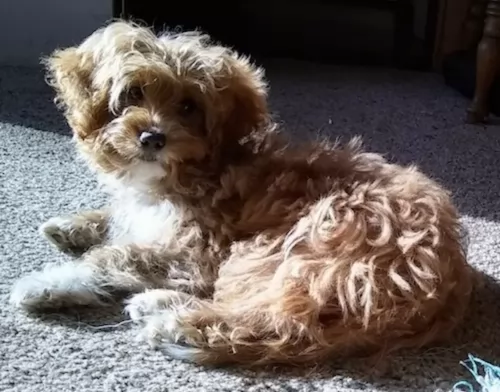 Every dog, even the little ones like this, will require some kind of input from you if you want to get the best from him. Every puppy bought as a gift when they’re cute and cuddly turns into an adult, and often the very person who received him as a gift, loses interest and neglects him. Then they wonder why the dog becomes irritating and destructive.
Every dog, even the little ones like this, will require some kind of input from you if you want to get the best from him. Every puppy bought as a gift when they’re cute and cuddly turns into an adult, and often the very person who received him as a gift, loses interest and neglects him. Then they wonder why the dog becomes irritating and destructive.
A dog is a long term investment and if you commit to your sweet Doxiepoo, you’ll get years and years of devoted friendship.
 The Formosan Mountain Dog is very child-friendly. He is affectionate and loyal to his family and protective of his children.
The Formosan Mountain Dog is very child-friendly. He is affectionate and loyal to his family and protective of his children.
He is intelligent and has exceptional hunting skills. He is a good guard dog due to his alertness, but they can be fear-aggressive.
He is very adaptable to living in any location as long as there is somewhere for him to get adequate exercise. He is friendly to people and animals.
He is intelligent and learns quickly.
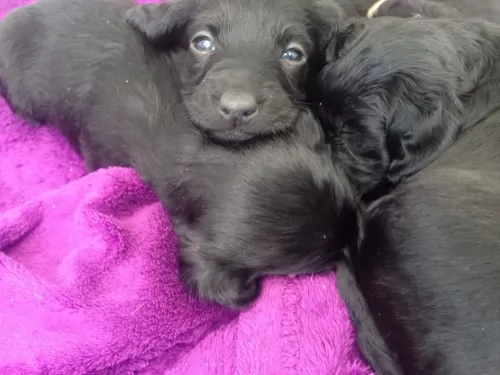 The life expectancy of the Doxiepoo is around 12-15 years of age if he is well looked after. He is a robust dog, but he can still face some health issues that both his parents contend with.
The life expectancy of the Doxiepoo is around 12-15 years of age if he is well looked after. He is a robust dog, but he can still face some health issues that both his parents contend with.
Just some of the diseases that the Doxiepoo might face while in your care are ear- and skin infections, dental disease, digestive tract problems, heart conditions and epilepsy. If you think your pet has any kind of illness, it is imperative to get him to the vet for a checkup.
Poodles, particularly are prone to skin disorders. They can be allergic to grass, parasites and food. If your Doxiepoo chews or licks his paws or some other area a lot, and the skin is red, he could have a skin allergy.
The vet will be able to diagnose your dog’s allergies with some skin- or blood testing. For instance, sebaceous adenitis is an inherited allergy that affects the lubrication of the skin and hair follicles. Symptoms of the disease include scaly skin, sore and even hair loss.
 Because there have not been any studies done on the health of the Formosan Mountain Dog, there is not a lot known about any inherent or genetic health issues. It would seem that some bloodlines are healthy, and others have some serious issues. Especially because there are no studies, it is important for breeders to test for eye issues and skeletal issues through the Orthopedic Foundation for Animals and the Canine Eye Registration Foundation.
Because there have not been any studies done on the health of the Formosan Mountain Dog, there is not a lot known about any inherent or genetic health issues. It would seem that some bloodlines are healthy, and others have some serious issues. Especially because there are no studies, it is important for breeders to test for eye issues and skeletal issues through the Orthopedic Foundation for Animals and the Canine Eye Registration Foundation.
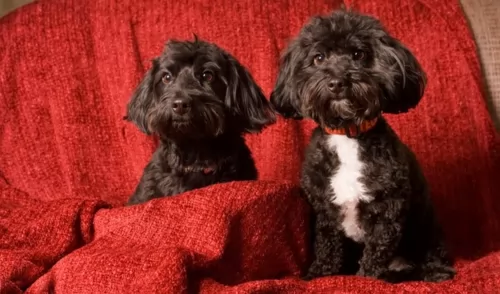 You can’t be sure what kind of coat your Doxiepoo will have but he will certainly require brushing at least twice a week. In some instances it may be wise to seek out the services of a professional groomer who does an excellent job of trimming the hair, cleaning the teeth, checking the ears and clipping the nails.
You can’t be sure what kind of coat your Doxiepoo will have but he will certainly require brushing at least twice a week. In some instances it may be wise to seek out the services of a professional groomer who does an excellent job of trimming the hair, cleaning the teeth, checking the ears and clipping the nails.
The Doxiepoo, just like any other dog, will need to be trained and socialized early as he is a stubborn dog and will need to be trained to be obedient. With this training and socialization, he becomes amicable around children and pets in the home. He learns easily too and this is what makes him a great pet for first time dog owners.
The Doxiepoo is a moderate energy dog, so he will do well on a walk every day. You can also make use of ropes, balls and frisbees to give him a bit of a workout in the garden.
He loves water too and will enjoy a run on the beach and cooling off in the ocean. He adapts easily to life in the city or in the country, so long as he is with his human companions.
The Doxiepoo will eat dry kibble, particularly if it is from the highest quality brands and chosen according to the dog’s size, age and activity levels.
Now and then you can add in a little bit of cooked rice, vegetables and chicken for variety. Some raw meat can play an important role in keeping the skin healthy and free from dryness and itchiness. Make sure that he always has fresh, cool water available to him.
 Feed a high-quality puppy food for medium size dogs at the rate of a ¼ cup twice a day until 8 months then ½ to ¾ twice a day until 12-16 months.
Feed a high-quality puppy food for medium size dogs at the rate of a ¼ cup twice a day until 8 months then ½ to ¾ twice a day until 12-16 months.
1 to 2 cups of high-quality dry food split into 2 meals per day.
Generally healthy breed. Keep clean and watch for mites.
This is an energetic breed and he needs a lot of exercise. He must have at least an hour of exercise daily but the more, the better. He loves swimming and jogging with his people. He’s athletic, smart and agile. He does well with field trials, tracking, agility, and obedience.